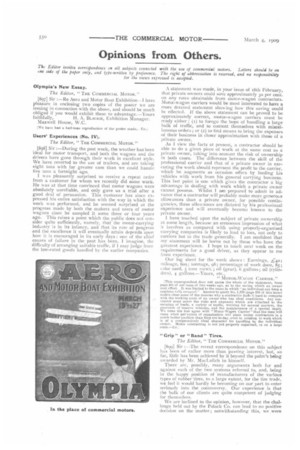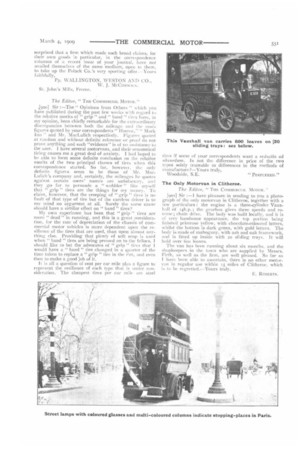Opinions from Others.
Page 18

Page 19

If you've noticed an error in this article please click here to report it so we can fix it.
The Editor invites correspondence on all subjects connected with the use of commercial motors. Letters one side of the paper only, and tybe-written by preference. The right of abbreviation is reserved, and no should be on responsibility for the views expressed is accepted.
Olympia's New Essay.
The Editor, "TILE COMMERCIAL MOTOR."
[897] Sir :—Re Aero and Motor Boat Exhibition—I have pleasure in enclosing two copies of the poster we are issuing in connection with the above, and should be much obliged if you would exhibit these to advantage,—Yours faithfully, H. A. BLACK1E, Exhibition Manager. Maxwell House, W.C.
[We have had a half-tone reproduction of the poster made. -En.i
Users Experiences (No. IV).
The Editor, "THE COMMERCIAL MOTOR."
1898] Sir :—During the past week, the weather has been ideal for motor transport, and both the wagons and the drivers have gone through their work in excellent style. We have reverted to the use of trailers, and are taking eight tons with far greater ease than we could handle five tons a fortnight ago.
I was pleasantly surprised to receive a repeat order from a customer for whom we recently did some work. He was at that time convinced that motor wagons were absolutely unreliable, and only gave us a trial after a good deal of persuasion. This customer has since expressed his entire satisfaction with the way in which the work was performed, and he seemed surprised at the progress made by both the makers and users of motor wagons since he sampled it some three or four years ago. This raises a point which the public does not consider quite sufficiently, namely, that the motor-carrying industry is in its infancy, and that its rate of progress and the excellence it will eventually attain depends upon how it is encouraged in its early days : one of the chief causes of failure in the past has been, I imagine, the difficulty of arranging suitable traffic, if I may judge from the low-rated goods handled by the earlier companies. A statement was made, in your issue of 18th February, that private owners could save approximately 30 per cent. on any rates obtainable from inotor-wagon contractors. Motor-wagon carriers would be most interested to have a more detailed statement showing how this saving could be effected. If the above statement can be proved to be approximately correct, motor-wagon carriers must be ready either : (i) to forego the hope of handling a large bulk of traffic, and to content themselves with miscellaneous orders ; or (2) to find means to bring the expenses of their business in closer approximation with those of a private owner.
As I view the facts at present, a contractor should be able to do a given piece of work at the same cost as a private owner, taking into account the risk of ownership in both cases. The difference between the skill of the professional carrier and that of a private owner in executing the work should represent the profit to the carrier, which he augments as occasion offers by feeding his vehicles with work from his general carrying business. This last point is one which gives the contractor a big advantage in dealing with work which a private owner cannot possess. Whilst I am prepared to admit in advance that a contractor will probably make more generous allowances than a private owner, for possible contingencies, these allowances are dictated by his professional experience and will eventually become known to the private owner.
I have touched upon the subject of private ownership at some length, because an erroneous impression of what it involves as compared with using properly-organised carrying companies is likely to lead to loss, not only to carriers but to the trade generally. I am confident that my statement will be borne out by those who have the greatest experience. I hope to touch next week on the requirements for a good driver, as they appear to me from experience.
Our log sheet for the week shows Earnings, -£40; mileage, 600 ; tonnage, 98; percentage of work done, 85; coke used, 5 tons iocwt.; oil (gear), 6 gallons; oil (cylinders), 4 gallon S.—Yours, etc., " Morort-WAr.ox CARRlER."
[This correspondent does not quote the whole of the statement, from page 451 of our issue of two weeks ago, as to the saving which an owner may effect. It was limited to the cases in which " an individual can keep a machine lulls oeceopred." Answer to query No. 1,378 (page 552 of this issue) makes clear some of the reasons why a uontractor finds it hard to compete with the working costs of an owner who has ideal conditions. Any contractor must cover the risks and expenses which are attached to the securing of loads, a variety of traffic, working for several masters, the provision of reserve vehicles, and the maintenance of a special depa. We none the less agree with " Motor-Wagon Carrier' that the time will come when per'ection of organisation will place motor contractors in a much better rcoition than they are to-day, even in relation to work which is of a comparatively ideal character for handling by the individual owner. Motor contracting is not yet properly organised, or on a large scale.—EP.2
"Grip" or "Band" Tires.
The Editor," THE COMMERCIAL MOTOR."
[899] Sir :—The recent correspondence on this subject has been of rather more than passing interest, but, so far, little has been achieved by it beyond the palm's being awarded by Mr. MacLulich to himself. There are, possibly, many arguments both for and against each of the two systems referred to, and, being in the happy position of manufacturers of the various types of rubber 'tires, to a large extent, for the tire trade, we feel it would hardly he becoming on our part to enter seriously into the controversy. Our experience is that the bulk of our clients are quite competent of judging for themselves, 1Ve are inclined to the opinion, however, that the challenge held out by the Polack Co. can lead to no positive decision on the matter; notwithstanding this, we were
surprised that a firm which made such broad claims, for their own goods in particular, in the correspondence columns of a recent issue of your journal, have not availed themselves of the same medium, open to them, to take up the Polack Co.'s very sporting offer.Yours faithfully,
Pp. WALLINGTON, WESTON AND CO., W. J. McCoRmAcis.
St. John's Mills, Frome.
The Editor, " THE COMMERCIAL MOTOR."
,[9001 Sir :—The " Opinions from Others " which you have published during the past few weeks Nvth regard to the relative merits of " grip " and " band " Tires have, in my opinion, been chiefly remarkable for the extraordinary discrepancies between both the mileage and the costs figures quoted by your correspondents" Homoc," " Mark Inn " and Mr. MacLulich respectively, Figures quoted at random and without definite reference or proof do not prove anything and such "evidence" is of no assistance to the user. I have several motorvans, and their economical tiring causes me a great deal of anxiety. I had hoped to be able to form some definite conclusion on the relative merits of the two principal classes of tires when this correspondence started. So far, however, the only definite figures seem to be those of Mr. MacLulich's company and, certainly, the mileages he quotes against certain users' names are satisfactory, and they go far to persuade a " wobbler " do myself that " grip " tires are the things for my Money. To claim, however, that the creeping of " grip " tires is no fault of that type of tire but of the careless driver is to my mind no argument at all. Surely the same cause should have a similar effect on " band " tires?
11Iy own experience has been that " grip " tires are more " dead" in running, and this is a great consideration, for the rate of depreciation of the chassis of commercial motor vehicles is more dependent upon the resilience of the tires that are used, than upon almost anything else. Providing that plenty of soft soap is used when " hand " tires are being pressed on to the felloes, I should like to bet the advocates of " grip " tires that I would have a " band" tire changed in a quarter of the time taken to replace a " grip "tire in the rim, and even then to make a good job of it.
It is all a question of cost per car mile phis. a figure to represent the resilience of each type that is under consideration. The cheapest tires per car mile are steel tires if some of your correspondents want a reductio ad absurdum, ls not the difference in price of the two types solely traceable to differences in the methods of manufacture?—Yours truly, Woodside, S.E. " PERPLEXED.
The Only Motorvan in Clitheroe.
The Editor, " TriE COMMERCIAL MOTOR.'
[901] Sir :—I have pleasure in sending to you a photograph of the only motorvan in Clitheroe, together with a few particulars : the engine is a three-cylinder Vauxhall of 14h.p.; the gearbox gives three speeds and reverse; chain drive. The body was built locally, and it is of very handsome appearance, the top portion being finished primrose yellow, with chocolate-coloured letters, whilst the bottom is dark green, with gold letters. The body is made of mahogany, with ash and oak framework, and is fitted up inside with zo sliding trays. Jt will hold over Goo loaves.
The van has been running about six months, and the shopkeepers in the town who are supplied by Messrs. Firth, as well as the firm, are well pleased. So far as I have been able to ascertain, there is no other motorvan in regular use within is miles of Clltheroe, which is in he regretted.--Yours truly,
E. ROBERTS.
























